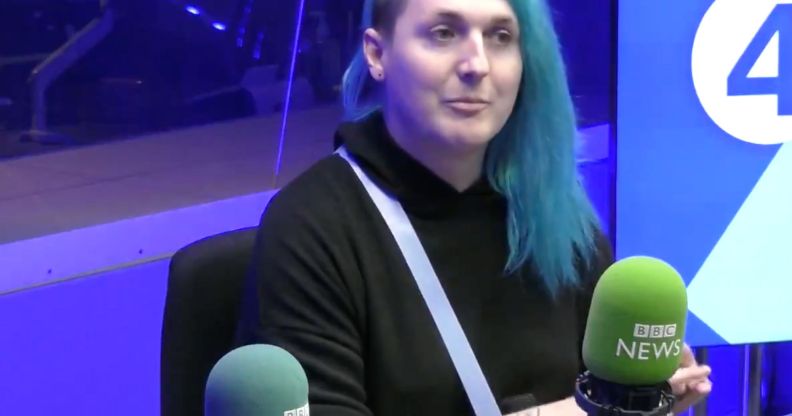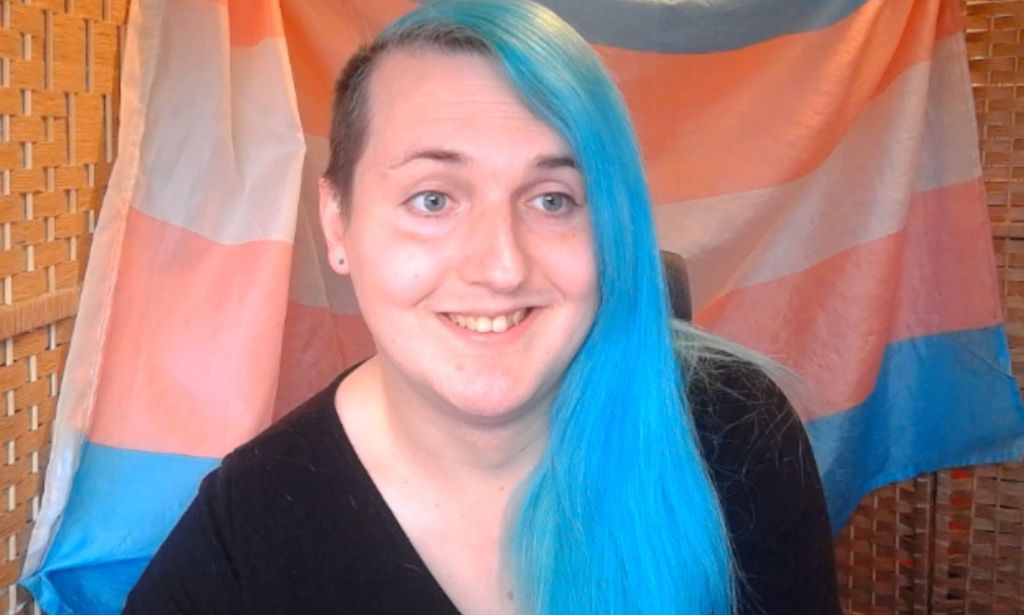Author perfectly explains Gender Recognition Certificates and UK trans rights in just two minutes

Laura Kate Dale explained what a Gender Recognition Certificate does during a BBC Radio 4 interview. (BBC)
Trans author Laura Kate Dale gave a masterclass on Gender Recognition Certificates (GRC) and trans rights in the UK, and it was truly amazing.
Dale took part in the increased discussions around GRCs after the UK government blocked Scotland’s landmark gender reform bill on Tuesday (17 January). She was at a Downing Street protest denouncing the Tory government’s decision before stopping by the BBC studios to talk about the misrepresentation of the Gender Recognition Reform (Scotland) bill (GRR), Equality Act and GRCs.
Scottish secretary Alister Jack said he believed the legislation would adversely impact the UK’s Equality Act, prompting him to use Section 35 of the Scotland Act to block it from becoming law.
However, he later failed to even define what a GRC is and how it would impact the Equality Act – spoiler alert, it doesn’t.
With so much misinformation flying around, Dale gave the perfect breakdown of what a GRC is and how it impacts the lives of trans people who can get the documentation.
“In the UK if you want to get married under your gender as a trans person, you have to have a Gender Recognition Certificate,” Dale said.
She continued: “For me, it was a case of I wanted to get married and I didn’t want to on my wedding day have to write down mister and male on what should be one of the most feminine feeling days of my life, getting married to the person I love.
“At the end of the day, there’s only really three things basically that the gender recognition certificate actually impacts.
“It’s who you can get married as, who you get buried as when you die – what name and gender is put on your death certificate – and some stuff around taxes and pensions.
“Largely a Gender Recognition Certificate, it’s important so that someone can be affirmed as who they are when they get married, and that when they die, their family can’t override their wishes and bury them as someone they’re not.”
BBC Radio4’s PM programme host Evan Davis clarified that a GRC is an “identity certificate rather than this is a license to do X, Y or Z”.
“It is about validity and about who you are not being disregarded,” Dale explained.
She continued: “It’s about on my wedding day, in my beautiful white dress, not having to go and say on this day I am male and write down mister on that certificate and forever have my wedding certificate say mister.
“It’s about being confident in the knowledge that, if and when I die, I won’t be buried as male. It’s fairly minimal little bits of paperwork.”
Davis then asked if the “Scottish made it too easy” to get a GRC, and Dale responded it hadn’t because GRCs “don’t impact anyone other than the person getting them”.
“To explain my own situation for about eight years before I got my Gender Recognition Certificate, I already had a passport that said I was female,” Dale said.
“All of my bank cards, all of my letters to my address were addressed to me. I was legally recognised as a trans person without having a Gender Recognition Certificate.”

Dale explained the Equality Act “recognises trans people as being transgender” and doesn’t require an individual to have a GRC to have that protection.
“If you say you are trans, if you have changed your name, if you have declared yourself as trans, we already have a situation in the UK where you are protected legally as a trans person,” Dale said.
The Gender Recognition Reform (Scotland) bill and GRCs do not affect the Equality Act whatsoever.
The measure, which passed with overwhelming support in Holyrood in December, removes barriers trans people face when applying for a GRC. This includes doing away with the requirement for a medical diagnosis of gender dysphoria, shortening the time an individual must live as their acquired gender and lowering the minimum age of applicants from 18 to 16.
As Dale mentioned previously, a GRC allows trans people to get their birth certificate changed to legally recognise their acquired gender.
It also allows trans people to be recognised on their marriage certificate and partnership documentation as their acquired gender and have their correct gender listed on their death certificate.
Both prime minister Rishi Sunak and Labour leader Keir Starmer voiced that they had ‘concerns’ over how the Scottish legislation would impact the Equality Act.
In an unprecedented move, the UK government used a Section 35 order under Scotland Act to prevent the GRR bill from becoming law. This is the first time such an order has been used since Scotland was given devolved powers.
LGBTQ+ advocates lambasted the move and warned the decision marked the “beginning of the end” of the UK as a union.

Dale told PinkNews she was “really reassured by how many trans allies, specifically Scottish trans allies”, attended the Tuesday protest outside Downing Street.
“There was a real sense of solidarity that the trans community recognises how Scottish people are having their legal system undermined, while they can see the trans community is being used as a political weapon and fear-mongering tactic,” Dale said. “We are both groups being screwed over in this situation, and that solidarity was a wonderful boost.”
Dale said it was also “incredibly empowering” to hear of another Downing Street protest Wednesday (19 January).
However, she expressed her disappointment at the “depressing lack of either basic understanding or willingness to admit” what a GRC does at the House of Commons debate on the GRR bill being blocked.
“At best, many of the people pushing to block this bill do not know what it actually does, and does not do,” she said.
She added: “At worst, they are willfully pretending not to know what it impacts, because to admit how little it affects would be to admit that this is not about protecting anyone, rather it’s about punishing the trans community and denying us incremental gains in rights.
“Alister Jack in particular is a great example of someone who either didn’t know what he was arguing for, or dodged admitting what he knew about the GRA’s actual impacts.

